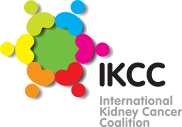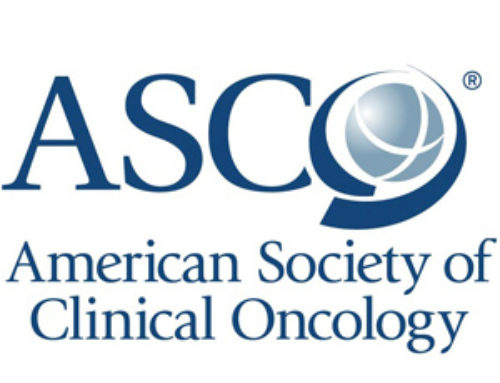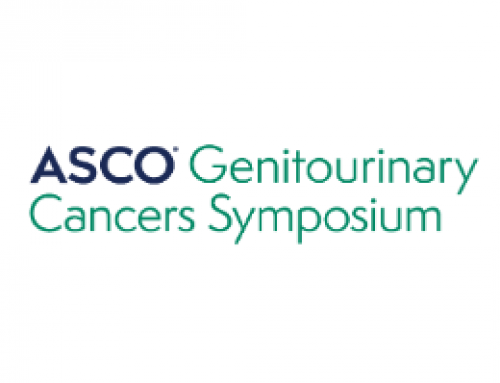This year’s American Society of Clinical Oncology (ASCO) Annual Meeting was held from 2-6 June 2023, in Chicago, USA. The presentations are available to view on the ASCO website. Some affiliates of the International Kidney Cancer Coalition (IKCC) went to the meeting to keep up to date with the care and treatment of patients with kidney cancer. A brief “Take home messages” section is followed by more in-depth review of selected abstracts.
Please note: The following summary was prepared for the benefit of patient advocates and patient organisations around the world who focus on kidney cancer. While this summary has been medically reviewed, the information contained herein is based upon public data shared at this meeting and is not intended to be exhaustive or act as medical advice. Patients should speak to their doctor about their own care and treatment.
Take home messages
In Abstract 4560, KCCure presented results from their survey of patients with kidney cancer that has spread. The survey looked at what is important for patients when selecting treatment. Most patients do not know the risk of their disease and what this means when choosing treatments. Patients said that a complete response to treatment in most important when choosing treatments. Cost is least important. Importance: More research is needed to improve communication between the patient and their doctor when making a decision about which treatments to have.
In Abstract 4502, results from the four-year follow up of the CLEAR study were presented. This study looked at the combination of lenvatinib plus pembrolizumab and compared it to sunitinib in patients who had not been previously treated for kidney cancer that has spread. The overall survival benefit continued for the combination at four years. However, the difference between survival for the combination compared to sunitinib had reduced significantly. Importance: While the time to when the cancer started growing again is better with combinations of immunotherapies and targeted therapies, like lenvatinib plus pembrolizumab, the difference in overall survival time is getting smaller with the combination over longer periods of time when compared to sunitinib alone. This may be due to the design of the study, or patients coming off combination treatment because of side effects or other reasons.
In Abstract LBA4500, results from the CONTACT-03 study were presented. This study looked at the effectiveness of atezolizumab plus cabozantinib compared to cabozantinib alone after previous immunotherapy treatment had failed. Unfortunately, the combination failed to improve the time to when the treatment stopped working. Importance: At this point in time, using the combination of a targeted therapy plus an immunotherapy does not appear better than using a targeted therapy alone in patients whose disease has got worse on previous treatment.
In Abstract 4518, early results from the KEYNOTE-B61 study showed that the combination of lenvatinib plus pembrolizumab is effective as a first-line treatment for advanced non-clear cell kidney cancer. The researchers presented more follow-up information from this study. Importance: This study shows that the combination of lenvatinib plus pembrolizumab is an effective first-line treatment for patients with different subtypes of non-clear cell kidney cancer.
In Abstract 4537, updated results and further follow up from the CaboNivo study with advanced non-clear cell kidney cancer patients were presented. Nearly half of the patients responded to treatment. Importance: The results from this study highlight the effectiveness of the combination of cabozantinib plus nivolumab in patients with metastatic non-clear cell kidney cancer, especially papillary kidney cancer.
In Abstract 4520, the combination of cabozantinib, nivolumab and ipilimumab is being looked at in patients with advanced non-clear cell kidney cancer. Importance: The triple combination of nivolumab, ipilimumab and cabozantinib showed some effectiveness in patients with non-clear cell kidney cancer.
In Abstract 4554, a small study looked at using a weakly radioactive protein (an antibody called 89Zr-DFO-girentuximab) to identify kidney cancer on scans. This study confirms that 89Zr-DFO-girentuximab is well tolerated and can accurately identify kidney cancer on a PET/CT scan. Importance: This product could help to diagnose kidney cancer more accurately without the need for a biopsy.
Abstract 4530 reports on a study looking at using cabozantinib as a second-line treatment after immunotherapy has stopped working and compares it to the use of other VEGFR TKIs in the real world. Importance: This study provides important information on the use of VEGFR TKIs after immunotherapy in the real world. Cabozantinib was effective after prior immunotherapy in patients with kidney cancer that had spread, regardless of previous VEGFR TKI treatment.
In Abstract 4540, the relevance of the questions on various quality of life questionnaires is assessed by kidney cancer patients. Few of the questions in the questionnaires were considered meaningful by patients.
Importance: This study confirms that health-related quality of life questionnaires for kidney cancer need major changes. The findings from this study will be used to help develop a new kidney cancer health-related quality of life questionnaire in partnership with patients.
Summaries
Abstract 4560: Patient priorities and expectation of anti-cancer treatments for metastatic kidney cancer
Dena Battle from KCCure presented some data from their survey of over 1000 patients from 28 countries, mostly the USA (85%). Treatment options for kidney cancer that has spread (metastatic kidney cancer) have increased over the past 10 years. Selecting treatment has become more complicated. Treatment guidelines recommend selecting treatment based mostly on kidney cancer risk, as well as the effectiveness of the treatment, patient characteristics, quality of life on treatment, cost, and patient preference. This presentation highlights what is important for patients when selecting treatment. This is important for treatment success, improving communication between the patients and their healthcare team, and future drug development.
Around 40% of patients in the survey had kidney cancer that has spread. 80% of these patients had already been treated with an anti-cancer medication. More than two thirds of patients (69%) did not know their risk for kidney cancer. The remaining third were split equally between favourable, intermediate, and poor risk.
Patients were asked to rank the most important outcome for the selection of treatment on a scale from 1 through 8. The chance to eliminate all evidence of disease (a complete response to treatment) scored highest (6.6), followed by the length of the response (5.1), improved quality of life (5.0), rapid reduction of tumours (4.9), ability to come off therapy (4.2), low risk of side effects (4.0) and reduction of tumour symptoms (4.0). Patients ranked low cost as the least important factor in selecting treatment (2.3).
A total of 70% of patients defined long-term response to treatment as five years or longer, and over a quarter of patients (26%) defined long-term response as 10 years or longer. When asked what a successful treatment is, most patients (83%) said a reduction in the size of the tumour on a scan is most important, followed by stable disease (67%), improved quality of life (48%) and the ability to return to work (22%).
This survey showed that most patients do not know the risk of their disease and may not realise what this means when choosing treatments. Patients said that a complete response to treatment is most important when choosing treatments. Cost is least important. Most patients’ idea of a long-term response to treatment is different to that of their doctor. More research is needed to improve communication between the patient and their doctor when deciding on treatment options.
Combination treatments for advanced/metastatic kidney cancer
Advanced/metastatic kidney cancer is often treated with a combination of medicines; either two infusions of immunotherapy (nivolumab and ipilimumab) or immunotherapy (avelumab, pembrolizumab or nivolumab) plus a vascular endothelial growth factor receptor (VEGFR) tyrosine kinase inhibitor (TKI) tablet (axitinib, lenvatinib, or cabozantinib). Many similar combinations have been tested and others are in development.
Combination therapies continue to be of interest at ASCO 2023, with the presentation of updated results from some ongoing studies. But crucially, none of these studies can help us with the critical question; which combination of treatments is best for an individual patient with advanced/metastatic kidney cancer?
Abstract 4502: Four-year follow-up with lenvatinib plus pembrolizumab: does the benefit continue?
In the phase 3 CLEAR study, lenvatinib plus pembrolizumab significantly improved the time to when the cancer started growing again and overall survival time compared to sunitinib when give as the first anti-cancer medication. The overall survival benefit continued for the combination at four years. However, the difference between survival for the combination compared to sunitinib had reduced significantly. The average time to when the cancer started growing again was nearly 2 years with the combination, compared to just over 9 months for sunitinib and was maintained.
Patients responded better to lenvatinib plus pembrolizumab, with more than 70% having a response to treatment, double that seen with sunitinib. Fewer patients taking the combination treatment had further anti-cancer treatment. Nearly three quarters of patients on the lenvatinib plus pembrolizumab combination had serious or, much more rarely, life-threatening side effects compared to 60% of patients on sunitinib.
This study showed that the improved survival with the combination of lenvatinib plus pembrolizumab in previously untreated advanced kidney cancer patients remained during the four-year follow-up. However, the difference between survival for the combination compared to sunitinib had reduced significantly. Reasons for this may be the effect of following treatments, stopping pembrolizumab at two years, or patients coming off combination treatment because of side effects or other reasons.
Abstract LBA4500: Is atezolizumab plus cabozantinib better than cabozantinib alone for previously treated metastatic kidney cancer?
The CONTACT-03 study was designed to look at the effectiveness of immunotherapy plus TKI after previous immunotherapy treatment had failed. The researchers thought that the addition of cabozantinib to atezolizumab may improve the time to when the cancer started growing again in these patients. Unfortunately, the combination of atezolizumab plus cabozantinib failed to improve the time to when the treatment stopped working and the cancer started growing again in patients who had stopped responding to previous immunotherapy.
The side effects from the combination of atezolizumab plus cabozantinib were like those seen when the medicines are taken alone. There were more side effects in patients taking the combination than in patients who were only taking cabozantinib.
Although the results from this study are negative, they could potentially change clinical practice with respect to the type of second-line treatment. It will encourage researchers to look at other treatment combinations for patients who had failed to respond to immunotherapy. For now, the recommendations are to use a targeted therapy like cabozantinib alone in most cases when initial treatment with combination therapy stops working.
Promising treatments for rare kidney cancer subtypes
There were several studies presented at ASCO looking at treatments for non-clear cell forms of kidney cancer this year. Non-clear cell kidney cancer is about 20-25% of all kidney cancer diagnoses, and includes various subtypes like papillary, chromophobe, translocation and unclassified tumours. Non-clear cell kidney cancer usually has worse survival than clear cell kidney cancer. Identification of an effective treatment for advanced non-clear cell kidney cancer remains an unmet need.
Abstract 4518: Lenvatinib plus pembrolizumab as a first-line treatment for advanced non-clear cell kidney cancer
The combination of lenvatinib plus pembrolizumab has already been shown to be effective as a first-line treatment for advanced clear cell kidney cancer. In the KEYNOTE-B61 study, early results showed that lenvatinib plus pembrolizumab is also effective as a first-line treatment for advanced non-clear cell kidney cancer. At ASCO, the researchers presented more follow-up information from this study.
There were 158 patients in the study. Most patients had papillary kidney cancer (59%). A fifth of patients had chromophobe kidney cancer, and a few had translocation kidney cancer (4%) or another subtype (6%). The subtype of kidney cancer was not known for the remaining patients (13%). Patients were followed for nearly 15 months. Half of the patients responded to treatment and the cancer was controlled in 82% of patients. Three quarters of patients had a response that lasted for at least one year. The response rate was similar for patients with different cancer risks (favourable, intermediate, and poor risk). The average time to when the treatment stopped working and the cancer started growing again was 18 months for all patients. Responses were seen in all subtypes of kidney cancer included in the study.
The side effects were like those previously reported for the combination of lenvatinib plus pembrolizumab. Side effects were reported by 94% of patients. The most common side effects were high blood pressure, diarrhoea, and hypothyroidism. About half of the patients reported serious or life-threatening side effects. Only 3% stopped treatment with the combination because of side effects.
This study shows that the combination of lenvatinib plus pembrolizumab is an effective first-line treatment for patients with different subtypes of non-clear cell kidney cancer.
Abstract 4537: Nivolumab plus cabozantinib for advanced non-clear cell kidney cancer
This poster presentation reported updated results and further follow up from the CaboNivo study with advanced non-clear cell kidney cancer patients. There were 40 patients in the study. Most patients had metastatic papillary kidney cancer. Nearly two thirds of patients were previously untreated, while a third of patients had been treated with a targeted therapy.
Nearly half of the patients responded to treatment. The average time to when the treatment stopped working was just over a year (13 months). In half of the patients their cancer had not progressed after one year. In a quarter of patients their cancer had not progressed after 2 years. 70% of patients survived for 18 months and 44% for 3 years. There was no difference in survival for previously treated and untreated patients.
Most patients (88%) reported a side effect, with just over half reporting serious or life-threatening side effects, such as liver damage, high blood pressure and pain. Treatment was stopped in 28% of patients because of side effects.
The results from this study highlight the effectiveness of the combination of cabozantinib plus nivolumab in patients with metastatic non-clear cell kidney cancer, especially metastatic papillary kidney cancer.
Abstract 4520: The effectiveness of a triple combination of cabozantinib, nivolumab and ipilimumab for previously untreated patients with advanced non-clear cell kidney cancer
The COSMIC-313 study previously showed a slight delay in the time to when the cancer started growing again when combining cabozantinib with two immunotherapy medicines, nivolumab and ipilimumab for patients with advanced clear cell kidney cancer. This combination of three anti-cancer medicines is being looked at in patients with advanced non-clear cell kidney cancer in a different phase 2 study.
40 patients were recruited for this study. Most patients had papillary (19), chromophobe (11) or translocation (5) kidney cancer. 1 in 10 patients had received previous treatment with targeted therapy, excluding cabozantinib and immunotherapy.
Since the study is still ongoing the patients are at various stages of their treatment schedule. At the time the results were looked at, 38 patients had started treatment and nearly half of them had received all four doses of ipilimumab and were continuing with nivolumab and cabozantinib. More than 80% of patients needed a reduction in their dose of cabozantinib from 40 mg/day to 20 mg/day or every other day.
Patients were followed for an average of 8.4 months. Eight (8) patients responded to treatment and this response lasted for at least 6 months. The average time to when the treatment stopped working and the cancer started growing again was nearly 9 months.
Three quarters of patients had serious or life-threatening side effects to treatment. More than a third of patients reported liver damage and 29% of patients had side effects that needed treatment with high dose steroids. 13% of patients stopped treatment because of side effects. There were no deaths.
This study shows that the triple combination of nivolumab, ipilimumab and cabozantinib showed some benefit in patients with non-clear cell kidney cancer, especially when compared to other treatments like nivolumab plus cabozantinib, or lenvatinib plus pembrolizumab. However, the trial is ongoing, and a further 20 patients are being recruited and treated with a lower starting dose of cabozantinib (20 mg/day).
Abstract 4554: Results from a phase 3 study of 89Zr-DFO-girentuximab for PET/CT imaging of kidney cancer
Researchers are looking for better ways to diagnose kidney cancer. Currently, diagnosis is made using scans, which cannot tell the difference between benign and cancerous tumours, and biopsy, which involves surgery and is not always accurate. There is, therefore, an unmet need for an accurate test to diagnose kidney cancer to guide patient management.
Girentuximab is an antibody that attaches to an enzyme called carbonic anhydrase IX (CAIX). This enzyme is found in clear cell kidney cancer tumours. 89Zr-DFO-girentuximab (TLX250-CDx) is a product made from combining a weakly radioactive molecule called zirconium Zr 89 with girentuximab. When given to humans, 89Zr-DFO-girentuximab binds to carbonic anhydrase IX in kidney cancer tumours and can help to tell the difference between kidney cancer, normal tissue, and other tumours.
Patients who were scheduled to have a partial nephrectomy within 90 days were given 89Zr-DFO-girentuximab 10 days before surgery and then had a PET/CT scan 5 days later. The scans were assessed independently to determine whether the patient had kidney cancer. Both the sensitivity and accuracy of the scans where assessed.
There were 300 patients in the study, two thirds of whom had clear cell kidney cancer. The results were assessed independently by 3 radiographers. The average sensitivity was 86%, and the average accuracy was 87%. Positive predictive values for kidney cancer were more than 90%. There were only two treatment-related side effects.
This study confirms that 89Zr-DFO-girentuximab is well tolerated and can accurately identify kidney cancer from a PET/CT scan. This is promising for the management of kidney cancer patients.
Abstract 4530: Real world information about the use of cabozantinib as a second-line treatment after immunotherapy in patients with metastatic kidney cancer
The standard of care for the first-line treatment of metastatic kidney cancer is usually immunotherapy. There is a lack of information about the use of cabozantinib after the use of first-line immunotherapy. This study looks at using cabozantinib as a second-line treatment after immunotherapy has stopped working and compares it to the use of other VEGFR TKIs.
This study collected real world information from hospitals around the USA. Information from patients with metastatic kidney cancer who had been on immunotherapy (or an immunotherapy combination) as their first-line treatment and were taking a VEGFR TKI as their second-line treatment was collected. The real-world response of patients to the second line VEGFR TKI treatment over the first 6 months of treatment was recorded.
Real-world information was collected from 485 patients. The characteristics of the patients were similar between those who were treated with cabozantinib and those treated with a different VEGFR TKI (including number and location of metastases). Information about the tumour at 6 months after the start of second line treatment was available for three quarters of the patients. At 6 months, 62.5% of patients responded to cabozantinib and 46% responded to the other VEGFR TKIs.
This study provides important information on the use of VEGFR TKIs after immunotherapy in the real world. Cabozantinib was effective after prior immunotherapy in patients with metastatic kidney cancer, regardless of previous VEGFR TKI treatment.
Abstract 4540: Health-related quality of life questionnaires for patients with kidney cancer: Patient-reported relevance of the questionnaires
Patients with advanced cancer want to live a good quality life for as long as possible. It is, therefore, very important to balance survival with quality of life for patients with advanced cancer. This study looks at the relevance of the questions on various quality of life questionnaires for kidney cancer patients.
Patients diagnosed with kidney cancer were asked to rate the relevance of each question in several quality-of-life questionnaires used for cancer patients (the FKSI-19, EORTC QLQ-C30, and EQ-5D). Patients were also asked 2 questions on topics not covered by the questionnaires. They were also asked about their views on wearable devices to assess health-related quality of life. The results were assessed by 2 independent reviewers.
A total of 116 patients were recruited from Brazil and the USA. Most (69%) were male, and the average age was 64. 83% were diagnosed with advanced kidney cancer, and three quarters had received immunotherapy and/or targeted therapy as their first anti-cancer treatment. Few of the questions in all the questionnaires were considered meaningful to the patients. Those considered meaningful were questions about lack of energy, fatigue, appetite, sleep, worry, ability to work, enjoyment and quality of life, and overall health. Patients suggested including questions about treatment side effects, emotional symptoms, physical function, social/family support, and financial distress. 58% of patients were open to using wearable devices to assess health-related quality of life.
This study confirms that health-related quality of life questionnaires for kidney cancer patients need major changes. The findings from this study will be used to help develop a new kidney cancer health-related quality of life questionnaire in collaboration with patients.
Acknowledgements:
Editor: Dr Eric Jonasch (USA)
Medical Reviewer: Dr Rachel Giles (NL)
Medical Writer: Dr Sharon Deveson Kell (UK)



